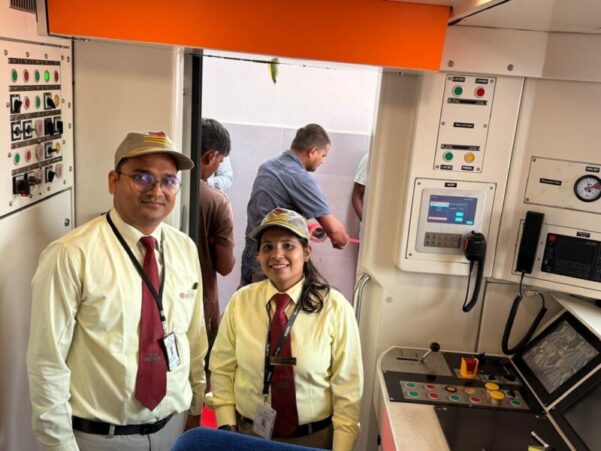
In a moment that marks both Bihar’s entry into India’s expanding metro network and a significant milestone for women empowerment, Swati Maurya has become the first woman loco pilot to operate Patna Metro’s inaugural services. When Bihar Chief Minister Nitish Kumar inaugurated the state’s first metro rail service on October 6, 2025, it was Maurya who sat confidently at the controls, transforming what could have been just another infrastructure launch into a powerful symbol of progress and gender equality.
From Banking Dreams to Metro Rails
Maurya’s journey to becoming Patna Metro’s pioneering woman pilot began unexpectedly during her college years. While studying at Patna Science College, she had initially prepared for banking exams like many young women in Bihar. However, destiny intervened during a routine visit to a bank to deposit money. “I saw people filling out Delhi Metro forms,” she recalls. “It just felt different — modern, challenging. I applied, even though I was preparing for banking exams”.
When examination dates for both the Delhi Metro and banking positions coincided, Maurya made a bold decision that would define her career. “I didn’t think much,” she says. “I just knew I wanted to do something that wasn’t expected of me”. This pivotal choice led to her selection as a Customer Relations Assistant with the Delhi Metro Rail Corporation (DMRC) in 2011.
Rising Through the Ranks
Maurya’s dedication and curiosity propelled her career forward within DMRC. By 2016, she had advanced to the position of station controller on the Violet Line. However, her fascination with train operations never waned. “Every time I saw the loco pilots, I thought — I can do this too. So, during the lockdown, I applied for the train operator exam,” she explains.
The transformation from station controller to loco pilot required extensive preparation. Maurya underwent rigorous theoretical and practical training covering signaling systems, punctuality protocols, and rolling stock management. After nearly five years of operating metro trains in Delhi, she became one of the few women in India certified to pilot metro trains.
Homecoming to Patna
When DMRC partnered with the Patna Metro Rail Corporation for operations, Maurya seized the opportunity to return to her roots. Arriving in September 2025 as part of a 33-member team from Delhi Metro on a 32-month deputation, she brought invaluable experience back to her home state.
The emotional significance of her role became evident when she conducted the first trial run of Patna Metro and later piloted the train during Chief Minister Nitish Kumar’s inauguration ceremony. “It was emotional,” she reflects. “To bring Bihar into the metro map and be the one driving that train — it’s a moment I’ll never forget”.
Confronting Gender Stereotypes
Maurya’s journey has not been without challenges, particularly in confronting deeply ingrained gender biases. She recalls facing skepticism and ridicule when she began her career as a train operator. “People used to say, if she’s a girl, how will she drive the train? She won’t be able to brake,” she remembers with a smile.
The doubts extended to practical concerns about her capabilities. “People would ask if the train would stop safely or if I’d manage the brakes,” she explains. “Some even said women shouldn’t take evening shifts. I ignored it all”. Her response was consistently professional excellence rather than confrontation. “Now, when people see me in uniform, they nod with respect,” she says.
Symbol of Changing Bihar
Maurya’s achievement reflects broader transformations in Bihar’s social fabric. She observes that the state has evolved significantly from when students had limited career aspirations confined to engineering, medicine, or government jobs. “Today boys and girls are not limited to jobs or engineering-medical, but are also stepping into startups and other fields with the aim of creating a different identity,” she notes.
Her family background also illustrates this progressive shift. As the eldest of three siblings, she drew inspiration from her father, a railway retiree, while her husband, a doctor, and mother-in-law have been sources of pride and support. “When the home environment is positive, women can make their mark in any field,” she emphasizes.
Technical Excellence and Safety
The Patna Metro system that Maurya operates represents cutting-edge urban transport technology. The three-coach trains can accommodate up to 945 passengers per trip, with 138 seats including 12 reserved for women and persons with disabilities. Each train features comprehensive safety systems including 360-degree CCTV cameras, emergency buttons, and direct communication with the driver.
Operating on a 4.3-kilometer elevated stretch connecting ISBT, Zero Mile, and Bhootnath stations, the metro runs from 8 AM to 8 PM with trains every 20 minutes. The affordable fare structure — Rs 15 for local journeys and Rs 30 for the complete route — makes the service accessible to diverse economic segments.
Inspiring the Next Generation
Maurya’s story resonates particularly powerfully in the context of women’s empowerment in India’s transport sector. Her achievement comes at a time when the country is making concerted efforts to increase female participation in traditionally male-dominated fields. The transport sector, which employs only 0.03% women nationwide, desperately needs role models like Maurya.
Her message to young women is both simple and profound: “Every girl should chase her dream, no matter how unusual it sounds. If I can drive a metro, you can drive your life wherever you want”. This philosophy aligns with broader government initiatives, including Bihar’s recent women employment schemes that have provided financial support to 7.5 million women in the state.
Part of a Larger Movement
Maurya follows in the footsteps of pioneering women like Surekha Yadav, who became India’s first female train driver in 1988 and recently retired after 36 years of distinguished service. These trailblazers have collectively opened doors for over 2,000 female train operators now employed by Indian Railways.
The significance extends beyond individual achievement to systemic change. As transportation infrastructure becomes increasingly central to urban development, having women in operational roles ensures that transport systems are designed and operated with diverse perspectives and needs in mind.
Looking Forward
As Patna Metro expands beyond its initial 3.6-kilometer priority corridor toward the planned 32.5-kilometer network with 24 stations, Maurya will continue playing a crucial role in Bihar’s transportation transformation. Her presence at the controls represents more than operational expertise — it embodies the state’s commitment to inclusive development and gender equality.
The story of Swati Maurya piloting Patna’s first metro train transcends transportation news. It represents the quiet revolution occurring across India as women break barriers in unexpected places, driven by competence, determination, and the courage to defy conventional expectations. In the driver’s cabin of Bihar’s first metro train, Maurya has not only transported passengers but carried forward the dreams and aspirations of countless women who see new possibilities in her pioneering journey.
Her achievement serves as a powerful reminder that progress often arrives not through grand gestures but through the steady determination of individuals willing to challenge the status quo. As more passengers board Patna Metro in the days ahead, they will be riding not just on modern infrastructure but on the dreams and dedication of a woman who dared to drive change, quite literally, through her home state.


